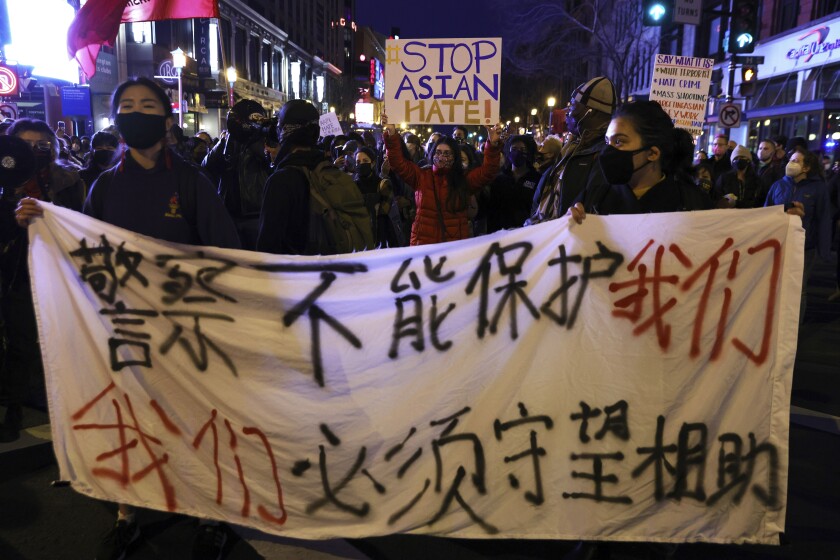Something shifted when three Asian-owned spas were shot up in Metro Atlanta on Tuesday night: A white man became the face of anti-Asian violence in America.
Less than a day later, after months of drumming up support by decrying anti-Asian hate crime, American law enforcement gave the game away once again. A white man had targeted Asian spas, killed eight people, six of them Asian women, and the police refused to recognize a racist motive.
Asian Americans have suffered an onslaught of harassment and hatred and violence since the beginning of the pandemic. Stop AAPI Hate, a tracking center for these incidents, recorded almost 3,800 firsthand accounts between March 2020 and February, the majority of them reported by women. There are no good data on the races of the perpetrators — presumably, with these numbers, they come from all kinds of backgrounds — but before Tuesday’s killings, some of the most publicized incidents involved Black assailants and elderly Asian victims. Mug shots and surveillance videos went viral, stoking old, unresolved tensions between Black and Asian Americans. Calls for ending anti-Asian hate sometimes mingled with anti-Black dog whistles and demands for increased policing. In this atmosphere, bolstered by a heightened fear of Black people, police departments were unequivocal in their condemnation of the violence. They expressed their concern to the media; they assembled task forces to fight anti-Asian hate crime.
And then a white mass shooter went after Asian women in Cherokee County, Georgia, and suddenly the police could no longer find the racism. At a news conference Wednesday, Atlanta Police Chief Rodney Bryant said it was too early to determine whether the massacre was a hate crime, while county Sheriff Frank Reynolds and Police Capt. Jay Baker blamed sexual addiction and a desire to eliminate “temptation,” downplaying the possibility that a man who shot up three Asian spas, killing six Asian women, was motivated by racism. They chalked up the coincidence to the suspect’s history with these spas, suggesting they were places he’d visited and calling them “targets of opportunity” — as if there’s any way this history could be unrelated to race.
It was a cold, stark reminder of our tenuous place in the American racial hierarchy. The police and law-and-order conservatives are always happy to use us and even protect us when it suits their needs. And although we might benefit from their attention, they don’t actually care about us. The system they serve wasn’t built for us. It was built for white people. Which is why we should be suspicious whenever we’re summoned into the halls of power.

Activists at a vigil Wednesday night in Washington hold a sign that reads in part, “Police cannot protect us.”
(Alex Wong/Getty Images)
Most of the time, we sit on the sidelines of American politics, but every now and then, we’re asked to come up front and play our little part. With our high SAT scores, our well-worn bootstraps, our vague general air of docility and quiet, we get a chance to shine as the model minority. For as long as we serve our purpose, we can hold honorary status on the side of power. That purpose is simple: to shame Black people and justify their oppression.
With Tuesday’s shootings, we stopped serving that purpose as non-white stand-ins for white concerns. We can’t sub in for white people when white people are killing us. And the women killed in Cherokee County were not obligingly useful model-minority archetypes. Some of them were low-wage workers, possibly sex workers, and whatever brought them to the spas — we know so little about them days later, but at least one of the Asian female victims was a customer on a spa date night with her husband — they were likely targeted because of their proximity to sex work. They weren’t helpless elders attacked by Black strangers; they were cast as exotic temptations for a white American Christian man.
Of course, the face of anti-Asian violence has always been white, and it isn’t one face, not even this one that I’ve already started forgetting, but the face of a system that devalues and scapegoats Asians. Last April, Police Capt. Baker bought a T-shirt that said “Covid 19 IMPORTED VIRUS FROM CHY-NA” and posted a picture with a link to the shop that sold it on Facebook. He endorsed the same racist views as our former president, who stoked anti-Asian sentiment by painting the coronavirus as the China virus, as kung flu, not a faceless public health crisis but an agent of yellow peril. Is it surprising, then, that he couldn’t acknowledge another white man’s racism? That he said a man who killed eight people at three separate Asian spas was just “fed up,” “at the end of his rope,” having “a really bad day”?
Asian Americans live in a murky gray zone in American politics — we aren’t white, we aren’t Black, but we can code in either direction, as white-adjacent or people of color. We don’t always have a choice in how we’re perceived, but we should recognize when we’re being used and resist the impulse to play along.
It isn’t just right to stand with Black Americans; it’s also smart, or at least smarter than the deeply stupid alternative. We saw the reward for the model minority this week. Let’s not sell our souls to reap so little.
The latest novel from Los Angeles author Steph Cha is “Your House Will Pay.”
"news" - Google News
March 19, 2021 at 11:23AM
https://ift.tt/3r00S8p
Steph Cha: Atlanta shooting tells us cops aren't our friends - Los Angeles Times
"news" - Google News
https://ift.tt/2DACPId
https://ift.tt/2Wh3f9n
Bagikan Berita Ini














0 Response to "Steph Cha: Atlanta shooting tells us cops aren't our friends - Los Angeles Times"
Post a Comment